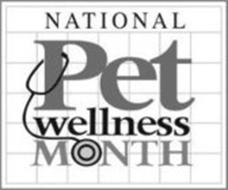October is National Pet Wellness Month, an annual event that promotes year-round pet wellness and owner education. Wellness care is not just about evaluating a well or healthy pet, but more importantly prevention of disease, delay of the onset of disease, and once a disease is present, the early detection of disease. Pet wellness also includes human wellness, because it involves the prevention and detection of animal diseases that can be transmitted to people.
There are many components to pet wellness. The cornerstone of wellness and preventative care is regular examinations. However, screening tests are also important aids to evaluate pets for problems that are unable to be detected by a physical exam alone. Blood, urine and fecal samples are collected for screening tests. Regular immunizations are recommended based on the lifestyle of the pet and are used to prevent disease. Oral exams, routine professional dental cleanings, and periodontal disease treatments are necessary for long-term health. Periodontal disease is the most common ailment affecting cats and dogs. Proper nutrition is vital for health. For example, most people inherently understand that if pets get too little nutrition, they cannot be healthy. But too much can be just as dangerous as too little. Obesity is a real and recently recognized problem for pets. According to the Association for Pet Obesity Prevention, 53 percent of adult dogs and 55 percent of cats are classified as overweight or obese by their veterinarians.
For puppies and kittens, wellness care monitors your pet's growth and development. It allows for the detection of infections and parasite infestations. Wellness and preventative exams assist in the prevention of disease by ensuring pets receive the appropriate vaccines, preventative medications, and nutritional guidance.
Adult pets also need wellness care. The appropriate selection of vaccines, preventative medications, oral health care, and nutritional advice are important for the prevention of disease. In addition, examinations and screening tests aid the early detection of problems before they become serious and expensive.
Mature dogs and cats still need the proper vaccine administration, preventative medications, oral health care, and nutritional counseling. Exams and screening tests are critical for the detection of age associated diseases and problems. They are also needed for the monitoring of any existing disease.
Since our pets age much faster than we do, problems can occur and progress quickly. Wellness and prevention exams, preferably at least twice a year, are strongly recommended to prevent and detect disease conditions. The goal is to help your pet live a longer and healthier life, while reducing the long-term costs of veterinary care.
To learn more about wellness and preventative care, call us or schedule an appointment to discuss the care options available for your pet.




